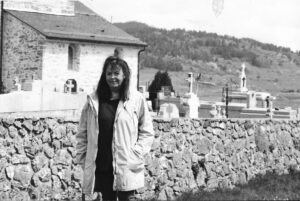 ‘Write what you know’ is a common enough diktat for the newbie writer, but how about the more subtle ‘write what you sense’ which carries far more possibilities. Material delivered by mysterious inner forces, as opposed to merely outer observations. Why? Because I’m a believer in the transmigration of souls, whereby a departing spirit finds the first empty womb to inhabit, as espoused by the hounded, tortured Cathars particularly from that beautiful, historic Ariège region of France during 1294 – 1324.
‘Write what you know’ is a common enough diktat for the newbie writer, but how about the more subtle ‘write what you sense’ which carries far more possibilities. Material delivered by mysterious inner forces, as opposed to merely outer observations. Why? Because I’m a believer in the transmigration of souls, whereby a departing spirit finds the first empty womb to inhabit, as espoused by the hounded, tortured Cathars particularly from that beautiful, historic Ariège region of France during 1294 – 1324.
To visit it, having read the historian, Emmanuel Le Roy Ladurie’s moving account of their lives in the hamlet ‘Montaillou’ and its seemingly still mediaeval surroundings, is to experience, like the shepherd Pierre Maury, mysterious timeslips. When interrogated under torture, as to where he’d been on a particular day, he replied, ‘out looking to find my shoe.’
‘What shoe?’ asked his interrogator.
‘One that I cast when I was a horse.’ Sealing his fate.
To read of these Cathars’ cruel deaths in Pamiers, Foix, and in Carcassonne’s ‘Tower of Justice’ during the early fourteenth century, is chilling, yet these gentle people who posed such a threat to the Catholic Church, will never be forgotten, and whenever I start new work, whether a poem, short story or novel, conflict between good and evil begins.
 Having reluctantly moved from our cottage near the River Sawdde in Llangadog, to urban Northampton, because of my now late artist husband Jeffrey’s new post at its university, I felt bereft, so, using a ruler to find the nearest coast, found where the River Nene, dividing Norfolk and Lincolnshire, meets the North Sea. Even now, that sense of death lurking in its silence, still lingers. I soon began ‘digging’ then writing the first few chapters of a part-contemporary/part-historical novel provisionally entitled, ‘Snare.’
Having reluctantly moved from our cottage near the River Sawdde in Llangadog, to urban Northampton, because of my now late artist husband Jeffrey’s new post at its university, I felt bereft, so, using a ruler to find the nearest coast, found where the River Nene, dividing Norfolk and Lincolnshire, meets the North Sea. Even now, that sense of death lurking in its silence, still lingers. I soon began ‘digging’ then writing the first few chapters of a part-contemporary/part-historical novel provisionally entitled, ‘Snare.’
Imagine my surprise having discovered Hilaire Belloc’s vivid collection of essays, ‘Hills and the Sea,’ in which he describes how once a newly-cleaned footbridge was re-opened in Sutton Bridge, those who’d been waiting then walked across it ‘into the Wringland.’ This name intrigued me, but learning it had evolved from ‘wrungo’ the old High German for ‘snare’ added to the weirdness. I met several people living on the Fens who wouldn’t allow their children to go out after dusk because of ‘evil spirits.’
‘Wringland’ was the first in a two-book deal with PanMacmillan in 2001. Here, the ghost of Martha Robinson – one of the last to be publicly executed in 1862 – tells a fragment of her story before each chapter, in which young, keen Abbie Parker, a saleswoman in a new housing development, arrives at its Show Home to find the door already unlocked, the alarm disabled, and a strange, black-clad woman sitting by her desk demanding Plot 2 be reserved for her. Someone badly wronged, seeking justice. But at what price for Abbie, with her new career?
While looking for a holiday home in France, we’d stopped by the Grotte de Lombrives near Tarascon, where I immediately began shivering with fear and begging Jeffrey to drive on. Only afterwards did I learn from my Dutch aunt how Frenkel – my middle name – evolved from those Franco-Raphaelite Jews, purged by the Spanish Inquisition. Many of whom were walled up alive in that very same grotto. This might explain my claustrophobia. I still can’t use the Underground, lifts or aeroplanes. Meanwhile, France with its relatively few cremations, although harbouring so much dark history, continues to inspire my later books.
http://www.sallyspedding.com
